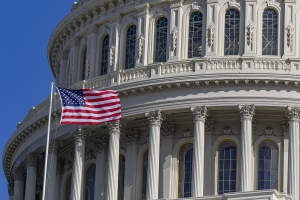Are You an American Idol-ator?
The phrase "God and country" means different things to different people, but when it is invoked to draw the color line between red and blue—while standing on the red side—it usually means something roughly like this: "God made this country great, and as long as we are a Christian nation, God is on our side."
For a Christian, saying, "God is on our side," or "My country right or wrong," is idolatry, because that is making a god of patriotism and one's nation. As Jesus said, we must always render unto Caesar the things that are Caesar's and unto God the things that are God's. Ultimate allegiance belongs to God, but God is not an American. He may choose to bless America or judge America, but He is not an American. Many Americans worship Him, but He is not an American. We must never presume that America's policies serve God's purposes.
The besetting sin of conservatives is to merge God and country as if they are virtually inseparable. A notable example of this error is proudly posted online by radio talk show host Chuck Baldwin, who quotes Pastor John Weaver of Georgia, a graduate in theology of Bob Jones University who has been preaching and teaching for thirty years.
The following excerpt is from Pastor Weaver's sermon "The Truth about the Confederate Flag." Pastor Weaver is at pains to establish the justness of the South's cause as a revolt against the tyranny of the North—a battle of states' rights over a tyrannical and "unlimited" federal government.
When an uneducated man, one that could not write, needed to sign his name please tell me what letter he made? An "X," why? Because he was saying I am taking an oath under God. I am recognizing the sovereignty of God, the providence of God and I am pledging my faith.
May I tell you the Confederate Flag is indeed a Christian flag because it has the cross of Saint Andrew, who was a Christian martyr, and the letter "X" has always been used to represent Christ, and to attack the flag is to deny the sovereignty, the majesty, and the might of the Lord Jesus Christ and his divine role in our history, culture, and life….
The Confederate Flag represents truth against error, freedom against tyranny, light against darkness and the Kingdom of Christ against the Kingdom of Governance.
Notice how and with whom Weaver identifies the South as the "just" combatant in what he calls the "War of Northern Aggression," a term used by some Southerners in place of the Civil War or the War Between the States:
You see, we have forgotten the fact that the War of Northern Aggression was a cultural war. It was a religious war and the North was predominantly Unitarian and humanist, while the South was predominantly Christian. And in reality, the War was an attempt to crush Christianity and Christian culture . . . What you and I need to do is this: we need to study our history. We need to study our heritage.
We need to come back to the basics. We need to come back to our Christian roots. I want you to turn in your Bibles to Jeremiah 6. Let me close with this verse. Jeremiah Chapter 6:16, "Thus saith the Lord, Stand ye in the ways, and see, and ask for the old paths, where is the good way and walk therein and you shall find rest for your souls, but they (the wicked people) said, We will not walk (therein)." What did God say? God said, "Stand in the ways and see and ask for the old paths, wherein is the good way." Let me tell you something folks, I would trade the culture we have today in a heartbeat for the culture that the South had before the War of Northern Aggression.
That's easy enough for Pastor Weaver to say, since he is white and would not be one of the three million African-Americans held in a horribly dehumanizing form of human bondage, and since he is a male and would not be a woman in a society where women couldn't vote and were second- or third-class citizens in virtually every important way anyone could imagine.
Weaver's views are the stuff of liberals' worst nightmares, and they have good reason to object to his prejudices. I and millions of my fellow Evangelical and Catholic social conservatives object to it because it is an egregious error to conflate the lordship of Jesus Christ and the authority of the Scriptures with the cause of fallen human beings—a grossly dubious cause, at that. The "old ways" to which the prophet Jeremiah was calling God's people were the ways of righteousness according to God's holy standards, not the days of white supremacy.
During the Vietnam War era, the antiwar protests triggered a backlash reaction of "my country, right or wrong; love it or leave it." But loving America doesn't mean uncritically accepting everything this country does. It may mean that you don't leave it, but you do have both the right and the responsibility to criticize and to seek to reform it. There are times when you criticize those you truly love. If you "love" your country so much you never believe it to be wrong, you have fallen into idolatry.
For example, some Christians were on the wrong side of slavery, and some Christians were on the wrong side of segregation. They claimed erroneous interpretations of the Scriptures to support their views. Christians in the South claimed that slavery is in the Bible and God condones it in the God-blessed order of things.
Some slavery advocates actually argued that slavery was a better system of labor management than the one that produced the industrial "wage slaves" of the North. As evidence to support their argument, they pointed to the desperately poor slums of New York and Chicago in the early Industrial Age.
In some cases, the pro-slavery advocates were accurate about the standard of living of some slaves versus that of some industrial workers in big-city slums, but that didn't make their argument right.
Respected scholar Eugene Genovese, a cradle Catholic turned Marxist who returned to his Catholic faith later in life, provides a masterful analysis of how some Christians in the antebellum South mounted a defense of slavery on biblical grounds. Anyone who thought that slavery would wither away of its own accord needs to read Genovese's The Southern Front, which profiles powerful and capable defenders of slavery whose erroneous understandings of the Bible led them to defend a status quo in which they were enmeshed.
I am not saying that there is always a clear right and wrong in every civil conflict. There were sincere Christians on opposite sides of the Revolutionary War.
But I think the clearest examples of wrongly conflating Christian faith with the American status quo are slavery and segregation. The first slaves came here in 1617. Slavery and racism have been defects in the American genetic code from our beginnings on this continent and led to our shameful treatment of Native Americans. The racism of European whites against African- and Native Americans has been an enormous blind spot where Scripture was either not applied or hugely misapplied.
Although hindsight is a tremendous advantage, I have to say our forefathers should have known better. Many of them did and spoke out against racism—men such as Roger Williams, Baptist pastor and founder of the Rhode Island colony, and David Brainerd, missionary to Native Americans. Williams treated the Native Americans with Christian compassion, and they took him in and treated him very differently than other whites of the colonial era. He was nearly sent back to England in chains when he insisted the colonists didn't own the land because they had obtained it by patent from the king and hadn't paid the Indians for it.
So here we have Roger Williams, invoked today as someone who taught that religion has no place in politics, up to his colonial eyebrows in the most controversial social and public policy issue of early-seventeenth-century America: the colonists' shameful treatment of Native Americans. He also said that the Church of England was not a true church, so one shouldn't attend its churches or pay taxes to it. And he believed Church of England ministers were not true ministers, so one should not listen to them preach.
But foremost in the Bill of Indictment against Roger Williams was his insistence that the colonists didn't own the land and hadn't paid the Indians for it. When he escaped into the bitter winter of the New England wilderness, the Indians took him in. They knew a friend when they saw one. Roger Williams believed in the separation of church and state—his metaphor was the garden of the church and the wilderness of the world, but his actions indicate clearly that he didn't believe in the separation of Christian faith from public policy.
____________________________________________________________
Dr. Richard Land is president of The Ethics & Religious Liberty Commission, the Southern Baptist Convention's official entity assigned to address social, moral, and ethical concerns, with particular attention to their impact on American families and their faith.





























